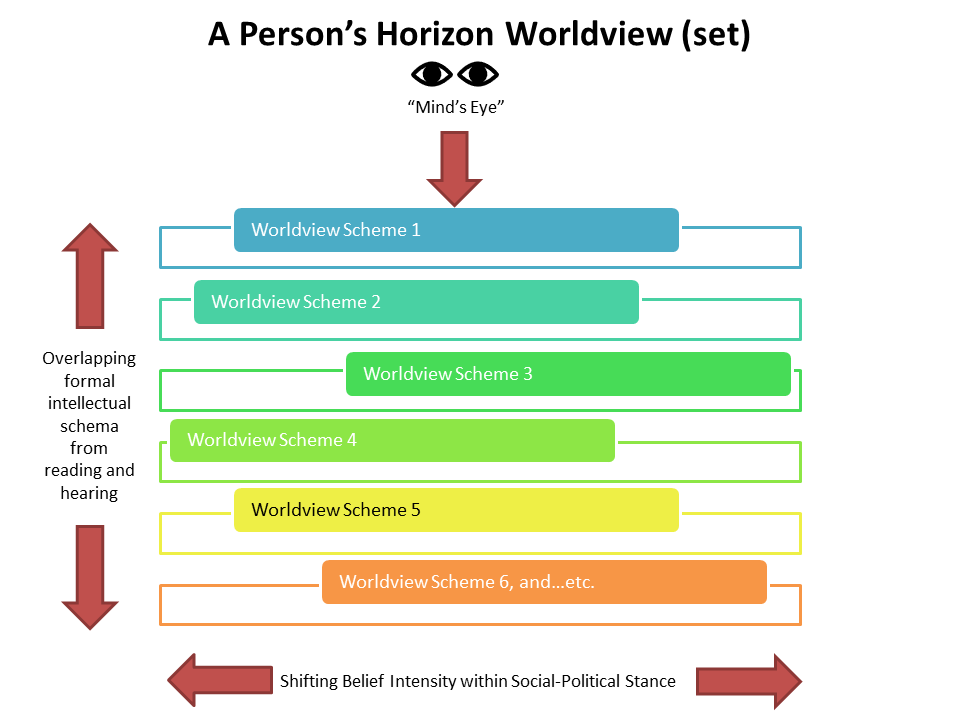
Mind’s Eye Of A Personal Horizon Worldview (Model 1)
This Project, ‘A.03 Book – Horizon Worldviews (Broad Society)’, explains the theory of the psyche-historiographical history, employing the empirical data of Queensland history 1911-2001 to develop the model as understood in a regional-local environment. There are several sociological and philosophy-of-mind models (currently eight). The primary model illustrated above is of the “Mind’s Eye” of a Personal Horizon Worldview. These are all abstract terms, so to the cynic who dismisses anything abstract from the start, and is unaware of their intellectual materialism, all I can say is that you are in a cognitive bubble. Here I offer a much bigger, a global, a universal, cognitive bubble, which greatly reduces the scope of your cynicism.
Currently, the argument works as follows:
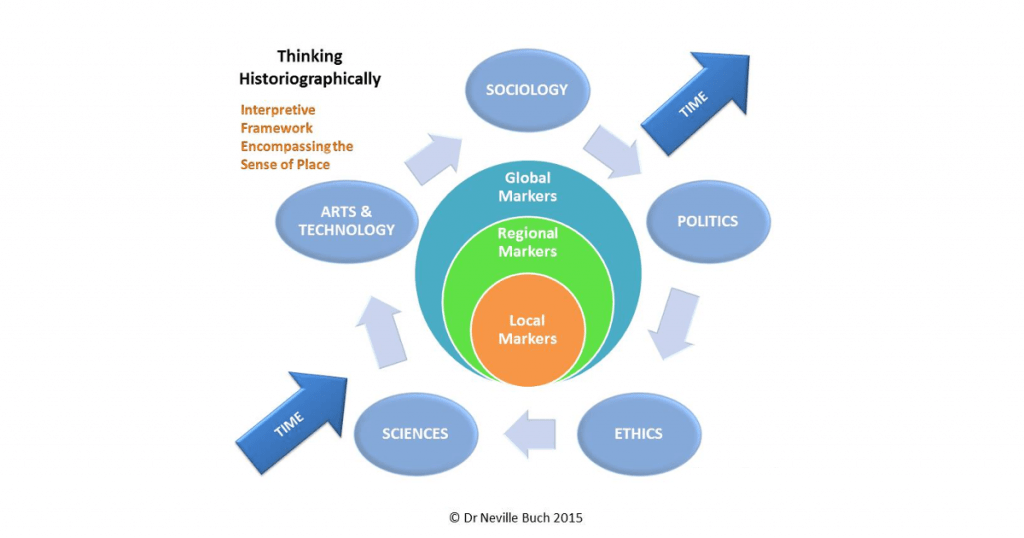
Thinking Historiographically (Model 2)
1.A. Both Personal and Public history, whether authors are aware or not, use the tools of historical sociology. In other words, the generalizations are drawn from the context of each time-space category that we recognise as particularly historical (i.e., each epoch or era, age, and so forth). There is circularity in this reasoning, but it is not the vicious cycle.
1.B. The logical circularity is the necessity of the horizon worldview(s) – the changing limits of our collected cognition. None of us are at the end of time-space, and so what is reasoned will always be diverse, partial, and fallible at any point of time-space. However, the more we collectively push the horizon out, the more we can fit the pieces of the puzzle towards a patchwork horizon worldview (shared sets); where reason works its best.
1.C. The literature here is informed from the field of historiography and identifying the connections with other disciplines.
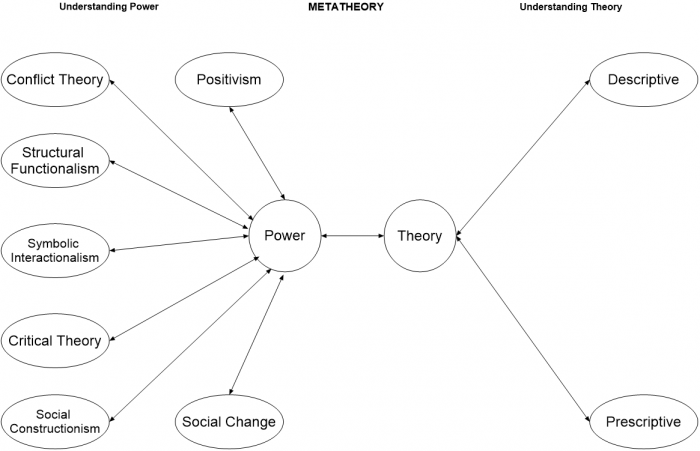
Power Theory (Model 3)
2.A. The nature of being humans is a structure in the relation between power and theory; both abstractly constructs horizon worldview(s). The literature here is informed from two key disciplines, the Sociology of Knowledge, and the History of Knowledge.
2.B. Much is revealed in the history of sociology used as political schema, and whether it is understood by a person or not, by the fact of reading and hearing persons construct their personal horizon worldview with such schema.
2.C. A theory is a contemplative and rational type of abstract or generalizing thinking about a phenomenon, or the results of such thinking. Theories are the links between the subject and the object, as the subject projects upon what is taken as a real world, a prior. Naturalism has its limits in the agent’s thinking, just as much as every personal judgement is limited. The literature on theory is massive, and categorisation of theory can be ‘cut’ in many ways. However, a useful ‘Theory of Theory’ approach would be to consider three terms: Knowledge which is (i) Descriptive and (ii) Prescriptive (normative), and what is called (iii) ‘Metatheory’. This book project is an example of metatheory. It combines the tasks and outcomes from Descriptive (Queensland History data) and Prescriptive/Normative (application of eight social science models) Knowledge and draws a theoretical conclusion (‘Horizon Worldview’). That is a metatheory. The power to do so brings understanding.
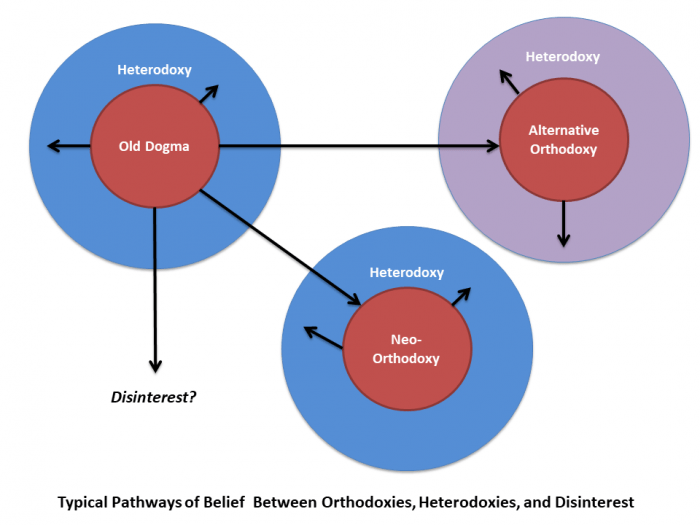
Typical Pathways Of Belief (Model 4)
3.A. At this point of the argument, a cynic will usually dismiss the semantics out-of-hand. The meaning of history (‘semantics’) is entangled in the inherited orthodoxies of childhood, along with abstract cognitive pathways (consciousness, not the depended-neural pathways) which better and creative thinkers search out. The conventional and dull thinker will dwell in the security of old dogmas (including hard materialism). Most believers do not wander far from home, but often are in the territory of heterodoxy unawares — deviation from accepted or orthodox standards or beliefs. All apologia deviates. And as the logic of the argument here points out, the cynic’s dismissive criticism of the semantics is subject to the same problem.
3.B. The cynic then usually objects on the semantics by inferring there has been illegitimate references of religious thought. Secularisation is strongly associated with the exit from established belief to a void of disinterest. However, that is a far too simplification, and merely expresses the prejudice of the conventional and dull thinker as reproduced for the unquestioning behaviourist (‘mind is just a behaviour’) for that choice of oppositional pathway. Whether there are references of religious thought, the dismissive claims are irrelevant; the argument stands on the anti-behavioural thesis of the Emergent Consciousness (e.g., David Chalmers). The cynic has not read his subject well-enough to understand what is going on as knowledge and meaning.
3.C. For the thoughtful believers of any system, the choice is typically to move within the same system to a neo-orthodoxy or to find an alternative. Again, there are secondary pathways within a sphere of heterodoxy, built upon the new orthodoxy or the alternative orthodoxy of another system.
3.D. The meaning of history is derived from mapping these pathways, which can be judged as progressive, a move in time for the better, or regressive, a move to a situation judged poorly from one or another stance on the map. Beliefs and doubts in history are important. Humans do not merely behave between input and output, unless a person, actually, does have their mind switched off (normatively not possible).
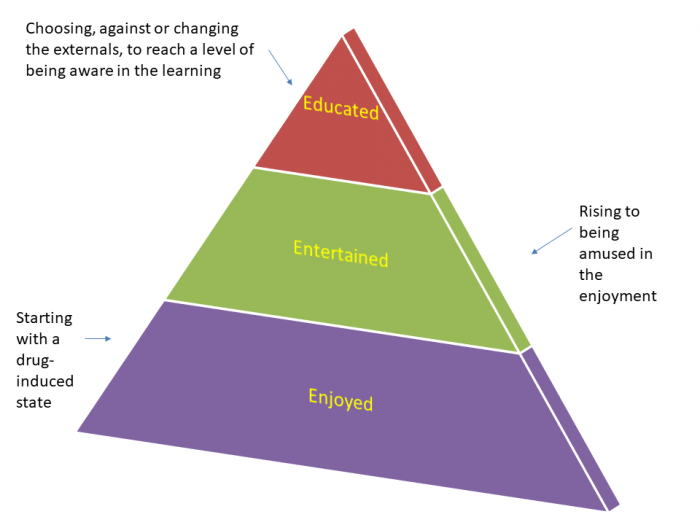
Buch’s Pyramid Of Social Personal Development (Model 5)
4.A. The Behaviourist counter-model cannot be dismissed out-of-hand. We play to better critical thinking rules than the cynic. The alternative model, to counter the Behaviourist counter-model, is the Buch’s Pyramid of Social-Personal Development Model:
4.A (i). Most of persons are bound to a work routine, where evaluation of the time is beyond our agency – we do what we do because…many external reasons beyond our control. For their leisure hours, most persons, for most amount of time, do not go beyond enjoyment. There is a drug-induced state, natural mechanisms of the human body, whether added to by pharmaceutical or leisure (alcohol and other pain-killing habits) substances or not.
4.A (ii). The better side of humanity rises to another level. There is some effort towards entertainment, which is a state of being amused and having passed the time more enjoyable than the drug-induced state. It is a state of the emergent consciousness in deliberate judgement. Unfortunately, less of the population rise to this level.
4.A (iii). The even better side of humanity, although fewer reach this level, is the state of being educated. It is the emergent consciousness in deliberate judgement, as also to be entertained, but it has the added dimension of critical awareness, the awareness that, I as a person, have learnt something.
4.A (iv, the analysis of the three levels). One of the problems in Mill’s pleasure principle is that pleasure is obtained at all three levels. Pleasure becomes meaningless if it is all things. Mill did try to resolve the problem with his pig satisfied and Socrates unsatisfied principle, but the argument appears to demonstrate that pleasure is not sufficient, even if we have Socrates with unsatisfied pleasure. The same problem exists for the concept of happiness in the American constitutional writers’ argument on what happiness is for the sake of governance. It may be educatively elitist, but with the bounded work routine, externally imposed, there is choice. It is the choice of resistance and dissent. Hence, the invitation for both changes in the externals and the internal reasoning.
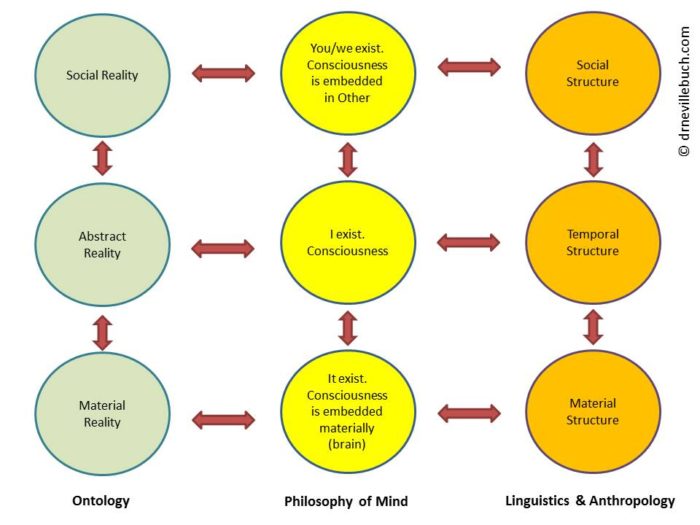
Interrelation Of Ideas On Consciousness And Reality (Model 6)
5.A. Different fields of philosophy and the humanities investigate the same ideas which have been so far explored in the book project. The purpose of Buch’s ‘Interrelation of Ideas on Consciousness and Reality Model’ (as illustrated) is to demonstrate the interrelation of ideas on consciousness and reality across three fields, and to show that the interrelation rejects the extreme positioning, one which articulates too simplistic dichotomies, and the other to reduce everything to the one idea or thing.
5.B. The cynic then usually objects on the philosophy-of-mind employed in the model. The cynic misunderstands the philosophers who continue to argue that the idea of self, personal identity, or ego, is an illusion. What has gone unnoticed in the Cynic’s objection is that ‘what it is to have an illusion’ requires a closed model, as the type used in this book project. ‘I’ believe that the talk of ontological illusion is confused. What is understood as ‘illusion’ is a trick to prevent a reality being perceived. A magician’s illusion is only understood when the trick is revealed against the background of reality. The magician had temporally been successful to elude our view of what she is really doing. When the trick is revealed we see that we have fallen for an illusion because there was something really happening which we were not perceiving. Hence, I cannot see how “self, personal identity, or ego,” is an illusion in any ordinary meaning. How is it possible to perceive that I do not exist, that I only have an illusion of existing, when it is ‘I’ that is the thinking thing which is doing the perceiving? The only logic which would work is that of a closed model and where the semantics of the ‘illusion’ is not normative.
5.C. There are three possible counter-arguments here: (i) A Knowable ‘God’, nirvana, or some ‘Other’ from where the perception lies and ‘I’ am merely the dream or the idea of that perception; The second and third possible manoeuvres are to point to the misapprehension in language; (ii) One option is to then to dismiss all metaphysics as unworthy of any serious comment; (iii) The other option, and the third manoeuvre, is to conclude that the logic of language does not reveal what is happening, and so we must abandon ‘logicentrism’. In the book project rebuttals are considered.
5.D. From that central idea of critical thinking, we have another metatheory. It is how the interrelation model demonstrates the problem in the ‘common sense’ worldview, and often as the worldview that is referred to as modernity. This view (e.g., starting from David Hume) is a counter-argument to the other major alternatives of the ancient world: (i) Solipsism – concluding that only ‘I exist’ or anything else is of no importance; and (ii) Immaterialism – concluding that only the idea exist and there is no material substance. In the modern world, those with cynical stances will attempt to argue that the book project ‘anti-realist’ options (the term ‘anti-realist’ is often misunderstood and is not solipsism or immaterialism as used in the term here) have become no more than epistemological exercises; thus, in common usage, no sane person will deny that other persons exist, or that we live only in a hard material world. The book project shows how these ancient ways of thinking, and now as the modern ‘common sense’, are logical fallacies and demonstrated in critical thinking.
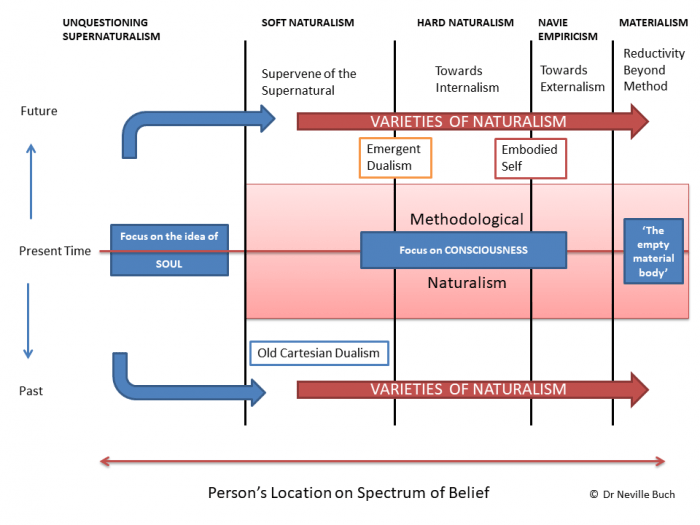
Persons’ Belief In Mind-Brain Spectrum (Model 7)
6.A. The Buch’s ‘Mapping Locations on the Mind-Brain Belief Spectrum’ model reframes the same argument of Buch’s ‘Interrelation of Ideas on Consciousness and Reality Model’, but addresses the Cynic with a positive alternative to the cynicism; in other words, if the cynic is wrong on their Mind-Brain model, what is a working model? Here is how the model works:
6.A (i). In the model there is the abstract movement from left to right which are possibilities of belief from an unquestioning supernaturalism to an empty materialism. Supernaturalism hangs on the ancient idea of soul but it is possible to carry that concept into a soft naturalism. The difference between the ancient conceptions along with, today, the thinking of naive modern fundamentalists, against the rest of our population, is that the supernationalism is so unquestioned that it has what most consider as a comical character. God is a comedian or superhero or super villain, quite literally.
6.A (ii). As soon as a methodological naturalism is adopted – and it begins with the ancients – it changes the game completely. Naturalism is basically the argument that supernatural entities – what we determine is above/outside the ordinary patterns (of science or common sense observation) – has no bearing on judgement. However, judgement can consistently work as compatibly between opposing principles or basic beliefs. Apparent contradictions might be resolved in a different rearrangement than what came before. Methodological naturalism is often the rearrangement – rearrange natural features into a theory without recourse to supernatural items.
6.A (iii). Therefore, it is common to have modern neo-evangelical Christian believers who articulate a soft naturalism via sufficient methodological naturalism where the supernatural supervenes, as a belief, which has no part of a naturalistic explanation. The structure of the belief frame can be seen in Stephen Jay Gould’s non-overlapping magisteria (NOMA).
6.A (iv). However, there is a further step that both Christian and Post-Christian believers have taken, and into a harder naturalism. The step is taken when a serious concept of ‘soul’ is abandoned for a focus on consciousness. Soul is now the empty metaphor, although useable as a literary device to describe ‘the spirit’, what is much better conceptualised as person or consciousness. Here is the complete abandonment of the Cartesian dualism, which, to the modern enquiring mind, appears as comical as the ancient soul.
6.A (v). However, it is still possible to retain a basic duality of mind and body where the mind is what we describe as what emerges/emerged in brain activity. At this stage of the spectrum there is greater latitude in explanation, for the very reason that ‘consciousness’ is a relatively new field and there is still considerable uncertainty or contention. Specifically, there are highly technical internalist-externalist debates which extend over into the fields of ontology, meta-ethics and epistemology. Currently, the idea of the ‘embodied self’ extents across the divide, but the more one pushes into a radical or naïve empiricism, which reject more and more of the theoretical components for the trust in the observational statements, the more the concept of ‘self’ is abandoned. When it is completely abandoned, we are left with ‘the empty material body’. There is no internal reasoning but only external judgement.
6.A (vi). The arrival in materialism also rejects any notion of duality or any layering beyond material existence. Materialism here might be better described as hard materialism whereas hard empiricism can be seen as a softer materialism with the possibilities of the observing self. The reduction move – cutting back the layers of internal reasoning – in the methodological naturalism has reached an absolute in the radical materialism.
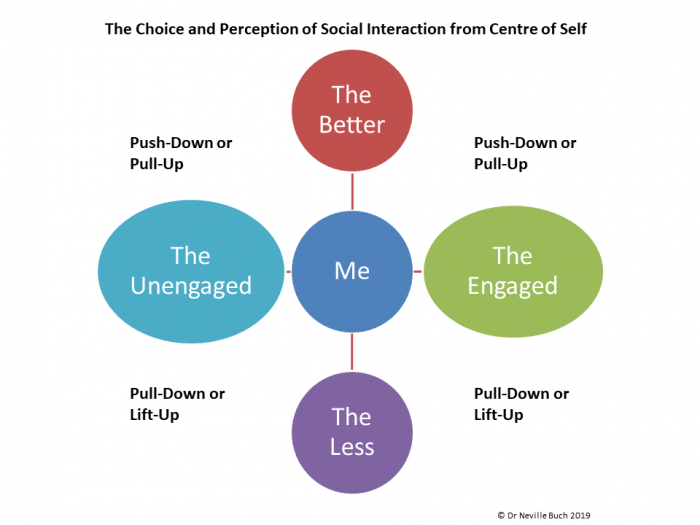
The Choice Perception Of Social Interaction (Model 8)
7.A. The Buch’s ‘Choice and Perception of Social Interaction from Centre of Self’ Model brings the book project to a conclusion and brings the history of Queensland out more formatively. What is not understood in Queensland history was there were many, many, historical players engaged in theories of personality and philosophical ideas of what made a person. This involved leading philosophers in Queensland, but it also involved many ordinary residents of the state who did not have the philosophical language. The model simply states that historical players have agency. Each person has had the capacity to divert from the script of time-space as we have once read history. Hard Determinism is an intellectual scheme which reads history backwards but fails to understand the concept of the present moment in the history-making. What choice was available to historical players is a key question for the better historian. This is the philosophical sub-field known as the study of ‘agency’. The model here offers an answer. The agency is potentially there for the historical player to be (i) cognitively engaged (meaning both thinking and passion/emotion as the one neural process: a set of processes) or unengaged; and (ii) to operate in an ethical framework which lift up or push/pull down “the betters” or “the less”.
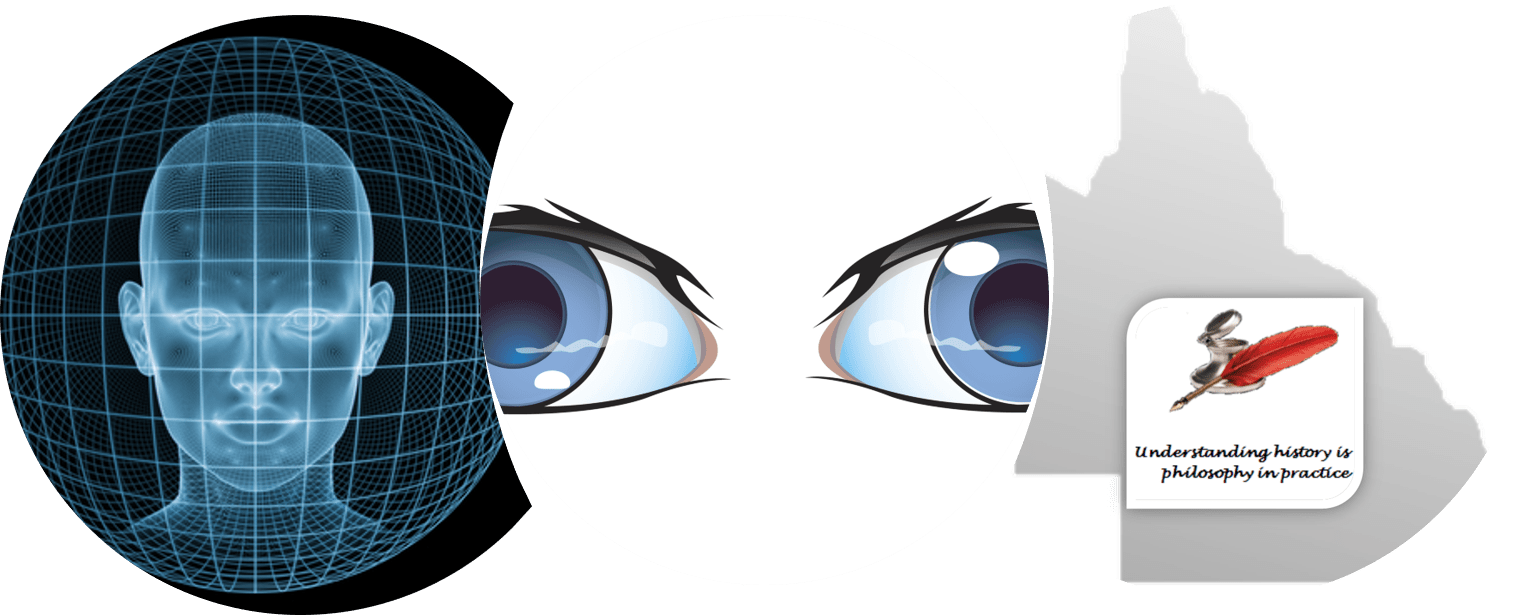
Queensland Horizon Worldview(s)
This is the way to assess Queensland history, and combines the resources of historiography, social psychology, and several branches of philosophy.
Neville Buch
Latest posts by Neville Buch (see all)
- J. D. Vance’s Insult to America is to Propagandize American Modernism - July 26, 2024
- Why both the two majority Australian political parties get it wrong, and why Australia is following the United States into ‘Higher Education’ idiocy - July 23, 2024
- Populist Nationalism Will Not Deliver; We have been Here Before, many times… - July 20, 2024
